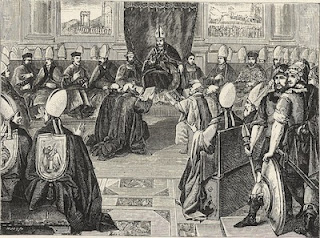On that day, Tostig and Hardrada left one-third of their forces guarding their ships; the rest went to Stamford for the meeting, about 10 miles away. It was also a space where the armies could settle for a little while, preparing the next phase of conquering England. The invaders saw no reason to hurry, since King Harold Godwinson was 190 miles south, guarding the shores in fear of the rumored invasion by Duke William of Normandy.
Harold had learned of Tostig and Hardrada's arrival even before Fulford, however, and knew he could not deal with war on two fronts. The northern problem had to be dealt with, and swiftly. In a feat that is probably unmatched in the history of warfare, Harold's army gathered from the shores and marched northward, achieving 190 miles in four days! He arrived one day after York had surrendered and the invaders had retired to its respective places. When Tostig and Hardrada and two-thirds of their forces prepared on 25 September to meet with the representatives from York, they were only lightly armored.
Seeing the English army approaching and dressed for battle, Hardrada quickly tried to arrange his men. The ensuing battle is called the Battle of Stamford Bridge because of a legend that a single large Norwegian held up the English forces at the bridge in Stamford (the illustration is of a modern bridge in Stamford). This allowed the Norwegian forces to prepare for battle.
It didn't matter: they were beaten decisively. Tostig was killed. Hardrada was killed by an arrow through the throat. A Norwegian noble named Eystein Orre, who was betrothed to Hardrada's daughter (with the non-Norwegian name) Maria, had been left to guard the ships. A messenger brought the news of the attack, and he and the rest donned their armor and rushed to Stamford. Supposedly they ran so fast that many of them collapsed and were no use in the fight, but the new arrivals were at least dressed for battle. Eystein picked up Hardrada's fallen standard and led a counter-attack. Eystein himself was quickly killed, at which the rest of the Norwegians fell into disarray and fled.
Harold had no time to deal formally with the Norwegians. They were allowed to depart to Norway. Tostig's sons went to Norway. Tostig's local allies from Scotland simply went home, as did Hardrada's allies from the Orkneys.
The Battle of Stamford Bridge took place on 25 September. Three days later, Duke William of Normandy landed at Pevensey on the south coast of England. We all know the battle of Hastings took place on 14 October. What was happening in the three weeks between those dates? Let's talk about that next time.


























